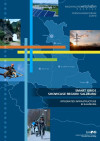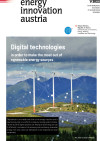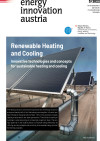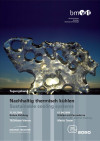Suchergebnisse für "Factsheet: Energietechnologien gestalten, die für alle sinnvoll und nutzbar sind"
Renewable resources in the building sector

Investigation of factors which support and hinder acceptance: Technical, legal/political and organisational levels considered, focus on innovative solutions with high market potential, thematic focal areas: straw bale building, surface treatment, acoustic and thermal insulation
VAMOS - Casement windows with vacuum glazing: Performance-Monitoring for Building retrofit
Knowledge consolidation of the exploratory project VIG_SYS_RENO; This project focused on the application of vacuum glass in existing casement windows for purposes of energetic performance improvement of buildings. Expected results include new insights about and a guideline for the application and utilization of vacuum glass products in existing window systems.
Climate neutral buildings from the period of promoterism - ways, potentials and possibilities of implementation
The focus was on the goal-oriented and economic options, in order to achieve a CO2-neutral energy supply and hermetically sealed building envelope as well as to show high energy efficiency when using. On the other hand building protection regulations and the quality in use are to be considered.
Evaluation of solar-thermal energy stores using a uniform and marketable system of characteristic numbers
Comparison of solar-thermal energy stores A clear and uniform system of characteristic numbers enables a cost-saving comparison of the efficiency of solar-thermal energy stores of different technologies for the first time and gives important impulses for the market.
CiQuSo - City Quarters with optimised solar hybrid heating and cooling systems
The project CiQuSo aimed to develop, evaluate and optimize concepts for solar energy systems to provide energy for buildings and cities. The applicability of the developed methods and concepts were shown as an example at Itzling, a part of Salzburg city.
Gründerzeit with future - demonstration project 2: ROOFJET Wißgrillgasse - sustainable solution for improving the thermal-energetic performance of a typical historical building in Vienna
The main aim of the project ROOFJET Wißgrillgasse is a building refurbishment by a factor of 8 which demonstrates that even historical buildings can be refurbished to lowest energy standard.This demonstration project shows a holistic and sustainable refurbishment concept for a special type of buildings with innovative technical and organizational solutions.
Building and modernising with "Building of Tomorrow"
The project BauModern turned to non-profit and commercial housing developers and real estate managements. In close co-operation with the federations of the housing and real estate economy has been achieved that builders are informed about market-suited innovative technologies and concepts and use these strengthened for their projects both in the new building and in the refurbishment.
OEKOPLUS-KOMPLEX - Analysis of the technical, economical and ecological preconditions for the establishment and utilisation of plus-energy-buildings and building assemblies
The evolution of the low energy house and the passive house standards to the plus energy standard results in a clear reduction of green house gas emissions as well as the primary energy input. The goal of the project was the determination of the technical, ecological and economic basic conditions for the construction and the use of "plus-energy-buildings" in order to finally realize them.
green LIGHT: light, fresh air, exterior space, greening in the large volume PassivHaus

theoretical topics: Optimization of natural light, ambient humidity and of private exterior space, planted over buildings, evaluation of the energetic performance and special challenges of large volume "Passivhaus" residential buildings. applied research: concept for the renovation of a 13 storey residential building for senior citizens built in 1974 to PassivHaus standards, applying the results attained in the theoretical part.
lieBeKlima - quality assurance of cross-property greening for urban climate resilience in the neighbourhood development "Am Kempelenpark"
lieBeKlima aims to initiate the implementation of a cross-property and cross-system greening concept for the "Am Kempelenpark" neighbourhood development. This will be realized with innovative, identity-creating participation processes and a comprehensive quality assurance process. The focus lies on an interconnected consideration of integral greening concepts with higher-level water management and plus-energy concepts.
LZE 100 Lighthouse Objects - Long-term evaluation of the energy consumption of 100 energy-efficient buildings in Austria as a representative cross-section of Austrian lighthouse objects
Collection, evaluation and analysis of energy consumption data from 100 energy-efficient buildings in Austria over an operating time of 3 to 25 years as a representative cross-section of Austrian lighthouse objects. Differentiation according to building types, energy sources and determination of real greenhouse gas emissions. Comparison of the measured consumption to benchmark values.
home dreams

Listening to the inhabitants of innovative buildings and using their satisfactory and unsatisfactory experiences as the basis for drawing up practice based criteria and recommendations for a quality, user-orientated building policy. The target groups are funding bodies, building contractors and town planners.
IEA Bioenergy Technology Collaboration Programme (IEA Bioenergy TCP)
IEA Bioenergy’s vision is to achieve a substantial bioenergy contribution to future global energy demands by accelerating the production and use of environmentally sound, socially accepted and cost-competitive bioenergy on a sustainable basis, thus providing increased security of supply whilst reducing greenhouse gas emissions from energy use.
Smart Grids Showcase Region: Salzburg

Integratred Infrastructure in Salzburg
Forschungsforum
2/2010
Herausgeber: BMVIT
Englisch, 6 Seiten
Downloads zur Publikation
Digital technologies

Digital technologies in order to make the most out of renewable energy sources.
energy innovation austria
1/2022
Herausgeber: BMK in cooperation with the Climate and Energy Fund
Englisch, 12 Seiten
Downloads zur Publikation
Renewable Heating and Cooling

Innovative technologies and concepts for sustainable heating and cooling
energy innovation austria
3/2022
Herausgeber: BMK in cooperation with the Climate and Energy Fund
Englisch, 12 Seiten
Downloads zur Publikation
Nachhaltig Thermisch Kühlen

Herausgeber: BMVIT
Deutsch, 118 Seiten
Downloads zur Publikation
Formulation developement fo a repellant against "game bite" to be used for forestry and vineyards
A repellent against deers containing sheep fat in different formulations for usage in forestry and vineyards should be developed with special attention to get a stabilized formulation with high quality. Efficacy and stability will be tested.
Indicators for urban areas – for construction, operation and mobility in climate-friendly areas
Development and coordination of indicators for energy and ecological evaluations of urban areas based on the Swiss 2000-Watt certification system. The results will be used for the development of a quality assurance system for urban areas similar to the klimaaktiv declaration for buildings and the e5 certification for communities.
Presentation of the effective use of innovative bioenergy technologies in the Austrian energy system of the future (BioEff)
The study shows possibilities and strategies for the effective use of innovative bioenergy technologies in Austria.
